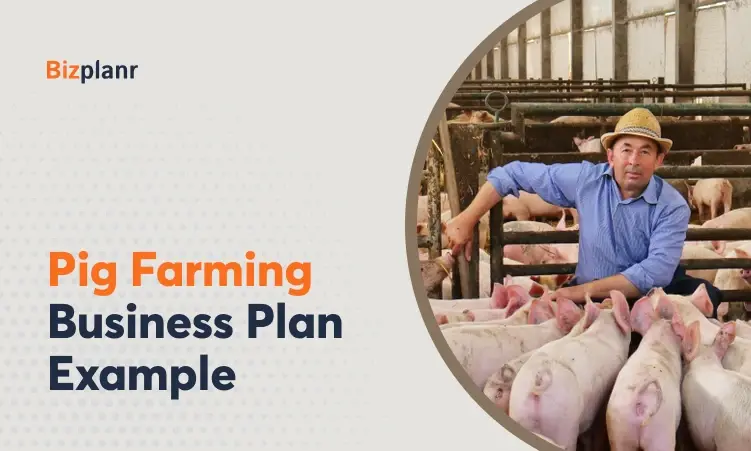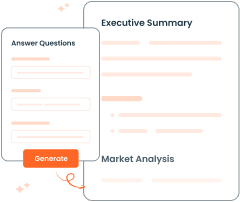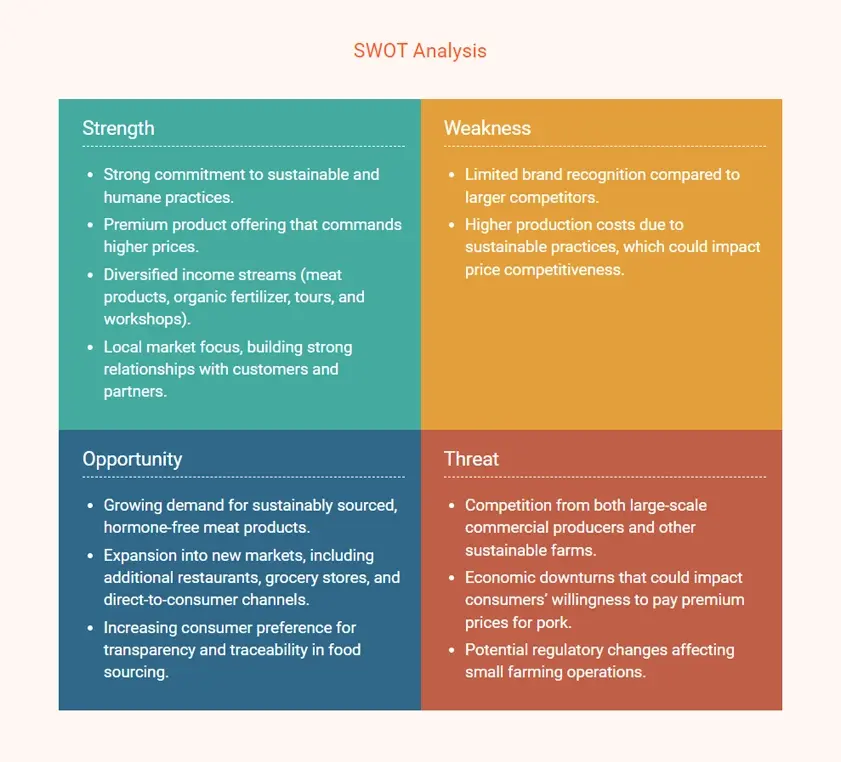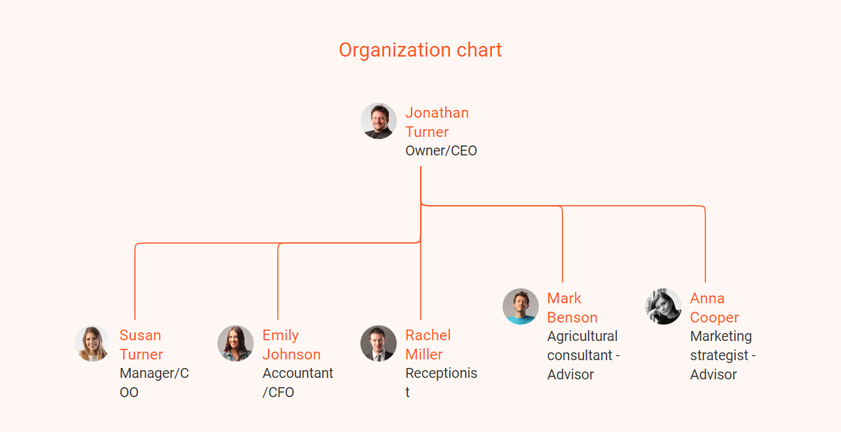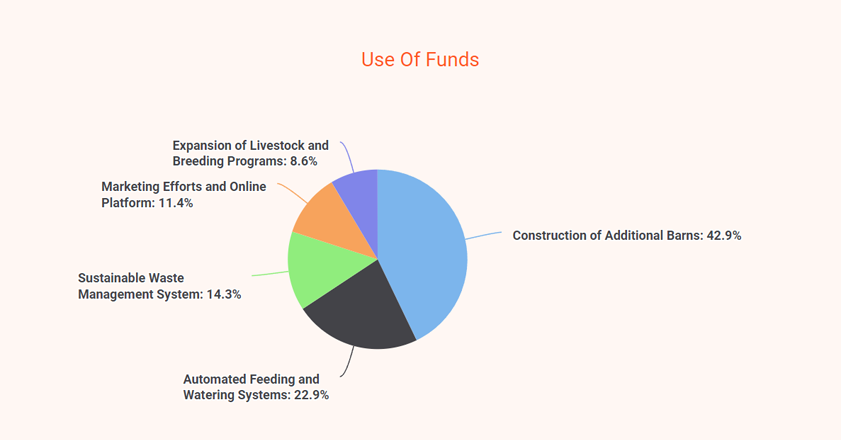Despite what may appear at first glance, pig farming can be a profitable business.
It’s a booming industry with increasing demand for pork presenting exciting opportunities for entrepreneurs.
However, running a successful pig farm involves more than just basic operations—it requires careful planning and strategy.
To make it easier, we've created a sample pig farming business plan using our AI business plan generator. You can use it to guide your planning process.
Excited to get started? Let’s go!
Pig farming business plan example
This pig farming business plan sample focuses on a growing agricultural sector in the USA, aiming to meet the increasing demand for high-quality pork products.
We hope this sample provides you with a strong foundation for starting your own pig farming business. Our expert business plan writers created this example to help guide you through planning your venture.
Executive summary
Oak & Clover Farms is a family-operated pig farming business located in Illinois, dedicated to producing high-quality pork using sustainable and humane livestock practices. The farm’s mission is to deliver premium, hormone-free pork products to local and regional markets while promoting environmental stewardship and animal welfare.
Oak & Clover Farms caters to a growing demand for ethically sourced meat, supplying grocery stores, farm-to-table restaurants, and health-conscious consumers.
In addition to premium pork cuts such as bacon, sausages, and ribs, Oak & Clover Farms offers whole hogs for custom events, organic fertilizer, and educational farm tours that engage the local community and promote agricultural learning.
Market analysis
This reveals that Oak & Clover Farms operates in a growing market driven by consumer interest in sustainably sourced, ethically raised meats. The farm’s target customers include local grocery stores, restaurants, and individual consumers seeking quality products.
Key competitors include both large-scale pork producers and other sustainable farms, but Oak & Clover Farms differentiates itself through its focus on family-run operations, community engagement, and diverse offerings such as organic fertilizer and livestock sales.
Organization and management
The team is led by Jonathan Turner as the CEO, with a strong team that includes Susan Turner as COO, and Emily Johnson as CFO. The management team brings expertise in farming, finance, and marketing, with additional support from experienced agricultural and marketing advisors.
Products and services
- Premium pork cuts
- Whole hogs
- Organic fertilizer
- Educational farm tours
Unique selling proposition (USP)
- Commitment to ethical farming practices
- A diverse range of products
- Meeting the needs of wholesalers, individual consumers, and businesses
Marketing and sales strategy
Focuses on hyper-local marketing through partnerships with grocery stores, restaurants, and farmers' markets. Oak & Clover Farms will leverage its online presence to sell directly to consumers while engaging the community through farm tours, workshops, and newsletters.
The farm seeks $350,000 in funding to expand its operations, including infrastructure improvements, feeding and water system upgrades, and advanced waste management solutions.
These funds will also support marketing efforts to increase production capacity and meet the growing demand for its products.
Financial projections
| Category | Year 1 | Year 2 | Year 3 |
|---|---|---|---|
| Revenue | $500,000 | $650,000 | $800,000 |
| COGS | $225,000 | $292,500 | $360,000 |
| Gross Profit | $275,000 | $357,500 | $440,000 |
| Operating Expenses | $180,000 | $202,500 | $225,000 |
| Net Operating Income (EBIT) | $95,000 | $155,000 | $215,000 |
| Net Income | $71,250 | $116,250 | $161,250 |
| Cash Balance (End of Year) | $50,000 | $90,000 | $130,000 |
| Total Assets | $420,000 | $470,000 | $520,000 |
| Total Liabilities | $270,000 | $225,000 | $180,000 |
| Owner's Equity | $150,000 | $245,000 | $340,000 |
| Net Cash Flow | $146,250 | $91,250 | $131,250 |
Oak & Clover Farms is committed to ethical farming and sustainability. It aims to be a leading provider of premium pork in the region, known for quality and responsible practices.
Liking the plan you're reading? It's AI generated.
Generate Your Own Using Bizplanr AI
Business description
Oak & Clover Farms is a family-run pig farm in Illinois that specializes in producing premium, hormone-free pork using sustainable and humane methods. The farm is dedicated to providing high-quality pork to local markets, catering to health-conscious consumers, grocery stores, and farm-to-table restaurants.
The farm's offerings include premium pork cuts like bacon, sausages, and ribs, whole hogs for special events, organic fertilizer made from manure, and educational farm tours to teach visitors about ethical farming practices.
Mission statement
To provide premium, sustainably raised pork through ethical farming practices that promote animal welfare, environmental health, and community involvement.
Vision statement
To be a leading name in sustainable pig farming, recognized for quality meat and a strong commitment to responsible agriculture.
Background information
Founded by Jonathan and Susan Turner, Oak & Clover Farms was created to meet the growing demand for sustainably sourced meat. The farm uses eco-friendly farming techniques and humane animal care, ensuring that its products are healthy and environmentally responsible. The farm avoids hormones and antibiotics, focusing on natural feeding practices for healthier, better-quality pork.
Along with pork production, the farm offers organic fertilizer, breeding stock, and community engagement through educational tours and workshops on sustainable farming.
Industry analysis
The U.S. pork industry is a major part of agriculture, contributing billions each year. Demand for pork is growing, both locally and through exports. However, more consumers now prefer meat that is sustainably and ethically produced, due to rising health and environmental concerns. Oak & Clover Farms is positioned in the sustainable pork niche, which is growing as awareness of food sourcing and animal welfare increases.
Industry overview
Large commercial producers, like Smithfield Foods, dominate the U.S. pork market. These companies focus on mass production, offering lower-priced products. However, smaller farms, like Oak & Clover Farms, are gaining popularity.
They emphasize sustainability, animal welfare, and natural farming, catering to consumers who are willing to pay more for ethically sourced pork.
Target market
Oak & Clover Farms targets the following customers:
- Local and regional grocery stores: Seeking premium, local, and organic products for health-conscious shoppers.
- Farm-to-table restaurants: Prioritize high-quality, sustainably sourced ingredients and are willing to pay for ethical meat.
- Health-conscious consumers: Shop at farmers' markets and online, seeking transparency in food sourcing.
- Wholesale clients: Distribute sustainably raised pork, expanding the farm's reach.
Market trends
Key trends impacting Oak & Clover Farms:
- Ethical and sustainable meat demand: More consumers prefer humanely raised, hormone-free pork.
- Organic and natural foods growth: Health-conscious shoppers are driving demand for natural and minimally processed foods.
- Farm-to-table movement: Restaurants increasingly source local, fresh ingredients, creating opportunities for local farms.
- Transparency and traceability: Consumers want to know where their food comes from, valuing farms that offer clear information on their practices.
Competitor analysis
Oak & Clover Farms operates in a competitive landscape of both large-scale commercial pork producers and smaller farms emphasizing sustainability and humane practices. Below is an analysis of key competitors and how Oak & Clover Farms differentiates itself:
1. Niman Ranch Pork
Known for high-quality, sustainable, and humane pork from small independent farms.
Strengths: Strong national brand recognition and loyal customer base.
Weaknesses: Limited local appeal due to its national focus and higher pricing.
Oak & Clover Advantage: Stronger local connection with direct-to-consumer sales and farm-to-table partnerships. Offers transparency through farm tours and events.
2. Beeler’s Pure Pork
Focuses on hormone-free, antibiotic-free, and natural pork.
Strengths: Well-known for clean, high-quality pork.
Weaknesses: Larger distribution network limits localized connections.
Oak & Clover Advantage: Differentiates by offering additional products (organic fertilizer, breeding stock) and hosting community-engaging farm tours and educational workshops.
3. Smithfield Foods
The world’s largest pork producer, offering low-cost, large-scale industrial farming pork.
Strengths: Global reach, cost efficiency, and affordability.
Weaknesses: Traditional farming practices, minimal focus on sustainability or animal welfare.
Oak & Clover Advantage: Commitment to humane, sustainable practices and premium, hormone-free pork, appealing to ethical and health-conscious consumers.
4. Farmland Foods (Smithfield Subsidiary)
Focuses on affordable, mainstream pork products.
Strengths: Large-scale production and competitive pricing.
Weaknesses: Lacks emphasis on sustainability and ethical farming.
Oak & Clover Advantage: Strong focus on eco-friendly farming and animal welfare, providing a clear alternative to industrial-scale operations like Farmland.
5. Hatfield Quality Meats
A regional producer with a focus on quality and humane animal care.
Strengths: Strong regional presence with a focus on humane practices.
Weaknesses: Lacks deep consumer connection and community engagement.
Oak & Clover Advantage: Offers direct-to-consumer relationships, farm tours, workshops, and diversified offerings like whole hogs for events and organic fertilizers.
SWOT analysis
Here’s a quick SWOT analysis of Oak & Clover Farms in the context of the current industry landscape:
Products or services
Oak & Clover Farms offers a variety of high-quality, sustainably produced pork products, along with additional services that align with the farm’s mission of sustainability, humane practices, and community engagement. The key offerings include:
1. Premium pork cuts
Oak & Clover Farms provides a range of premium pork products, including bacon, sausages, ribs, and other high-demand cuts. All pork is hormone-free, raised using ethical and sustainable farming practices to ensure top quality and flavor.
2. Whole hogs for special events
The farm caters to events by offering whole hogs for custom orders or special occasions. This service is ideal for farm-to-table dinners, local festivals, and private celebrations, and supports customers looking for fresh, responsibly raised pork.
3. Livestock sales
Oak & Clover Farms also specializes in breeding and offers high-quality pigs as breeding stock for other farmers and agricultural operations that prioritize natural, sustainable livestock practices.
4. Organic fertilizer
Leveraging the natural manure from its pigs, the farm produces organic fertilizer, providing an eco-friendly option for local farmers and gardeners. This aligns with Oak & Clover Farms' commitment to sustainability and resource efficiency.
5. Educational farm tours and workshops
The farm opens its doors to the public for educational tours, focusing on sustainable farming, animal welfare, and eco-friendly practices. It also conducts agricultural workshops, aiming to teach local communities, schools, and aspiring farmers about ethical livestock management and organic farming techniques.
Unique selling points
- Emphasis on humane, ethical livestock-raising practices.
- Eco-friendly, sustainable farming techniques, appeal to environmentally conscious consumers.
- Diverse product offerings include not only meat but also educational services and organic fertilizer.
- Focus on community engagement through tours and workshops, setting Oak & Clover Farms apart from larger competitors.
Organization and management
- Owner/CEO: Jonathan Turner
Oversees the overall operations and strategic direction of Oak & Clover Farms. Responsible for long-term planning, business development, and maintaining the farm’s values of sustainability and humane farming practices.
- Manager/COO: Susan Turner
Manages day-to-day operations, including livestock care, farm staff coordination, and ensuring that sustainable farming practices are adhered to. Also responsible for coordinating product supply and overseeing educational farm tours and workshops.
- Accountant/CFO: Emily Johnson
Manages the farm’s financial health, overseeing budgeting, accounting, financial planning, and ensuring profitability while maintaining ethical standards in operations.
- Receptionist: Rachel Miller
Handles customer inquiries, schedules farm tours and workshops, manages communications with wholesalers and individual clients, and provides general administrative support.
- Advisors
Agricultural Consultant: Mark Benson
Provides expert advice on livestock breeding, sustainable farming practices, and optimizing production processes.
Marketing Strategist: Anna Cooper
Assists with branding, marketing, and expanding Oak & Clover Farms’ reach within the local and regional market, focusing on communicating the farm’s values to health-conscious consumers and businesses.
Organizational chart For Oak & Clover Farms
Marketing and sales strategy
Oak & Clover Farms focuses on promoting sustainability, humane farming, and premium pork products. The strategy combines community engagement, local partnerships, and a strong online presence.
1. Local partnerships
- Build relationships with local grocery stores, farm-to-table restaurants, and butchers to supply ethically raised, hormone-free pork.
- Participate in farmers' markets to connect directly with health-conscious consumers and build the farm's reputation locally.
2. Direct-to-consumer sales
- Use the farm’s website and social media to sell products directly, offering premium pork cuts and whole hogs.
- Expand beyond the local area while maintaining transparency and quality through online sales.
3. Brand building through online presence
- Develop a website showcasing Oak & Clover Farms' story, values, and products, allowing customers to learn and order online.
- Leverage social media (Instagram, Facebook) to share insights into ethical farming, promote farm tours, and engage with followers.
4. Community engagement
- Host farm tours and workshops to connect with the community and educate them on sustainable farming practices.
- Offer educational workshops for schools and aspiring farmers, enhancing brand awareness and loyalty.
5. Newsletter marketing
- Send a monthly newsletter to customers with farm updates, product availability, exclusive offers, and insights into sustainability, fostering customer loyalty.
Financial projections
Oak & Clover Farms’ financial projections are built around its planned growth in product sales, operational expansion, and consistent community engagement. The projections provide a realistic outlook on the farm’s expected revenue, expenses, and profitability over a 3- to 5-year period, assuming successful implementation of the farm’s business and marketing strategies.
Income statement (First 3 years)
| Income Statement | Year 1 | Year 2 | Year 3 |
|---|---|---|---|
| Revenue | $500,000 | $650,000 | $800,000 |
| Cost of Goods Sold (COGS) | $225,000 | $292,500 | $360,000 |
| Gross Profit | $275,000 | $357,500 | $440,000 |
| Operating Expenses | $150,000 | $170,000 | $190,000 |
| Marketing Expenses | $30,000 | $32,500 | $35,000 |
| Total Operating Expenses | $180,000 | $202,500 | $225,000 |
| Net Operating Income (EBIT) | $95,000 | $155,000 | $215,000 |
| Taxes (25%) | $23,750 | $38,750 | $53,750 |
| Net Income | $71,250 | $116,250 | $161,250 |
Cash flow statement (First 3 Years)
| Cash Flow Statement | Year 1 | Year 2 | Year 3 |
|---|---|---|---|
| Cash Flow from Operations | |||
| Net Income | $71,250 | $116,250 | $161,250 |
| Depreciation (Non-cash) | $10,000 | $10,000 | $10,000 |
| Change in Accounts Receivable | ($5,000) | ($5,000) | ($5,000) |
| Change in Inventory | ($5,000) | ($5,000) | ($5,000) |
| Net Cash from Operations | $71,250 | $116,250 | $161,250 |
| Cash Flow from Investing | |||
| Capital Expenditures | ($150,000) | - | - |
| Net Cash from Investing | ($150,000) | - | - |
| Cash Flow from Financing | |||
| Debt Issuance | $250,000 | - | - |
| Debt Repayment | ($25,000) | ($25,000) | ($25,000) |
| Net Cash from Financing | $225,000 | ($25,000) | ($25,000) |
| Net Change in Cash | $146,250 | $91,250 | $131,250 |
| Ending Cash Balance | $50,000 | $90,000 | $130,000 |
Break-even analysis
The break-even revenue is calculated by dividing the fixed costs by the contribution margin (1 - variable costs). For Year 1, Oak & Clover Farms needs to generate approximately $327,273 in revenue to cover all its costs.
| Break-Even Analysis | Year 1 |
|---|---|
| Fixed Costs | $180,000 |
| Variable Costs | 45% of revenue |
| Break-Even Revenue | $327,273 |
Funding request
Oak & Clover Farms is seeking $350,000 in funding to support its expansion and operational improvements. This investment will allow the farm to scale its operations, meet growing market demand, and enhance its sustainability efforts.
The funds will be allocated as follows:
What is a pig farming business plan?
A pig farm business plan is a comprehensive guide that lays out the approach you’ll take to launch and expand your pig farming business. It covers key aspects such as market research, customer demographics, and competitor insights to ensure your farm is set up for success.
Additionally, the plan outlines the amount of funding required for growth and uses financial projections to demonstrate the farm’s long-term profitability and viability.
Why do you need a business plan for your pig farming business?
- Secures funding: A business plan helps attract investors and lenders by showing your business is viable.
- Guides your strategy: It outlines your goals and strategies, keeping you on track as you grow.
- Sets financial goals: It provides financial projections to help measure your progress.
- Improves decision-making: It helps you make informed choices based on clear objectives.
- Attracts partnerships: A solid plan can help you build partnerships by sharing your vision.
- Identifies challenges: It helps you foresee and prepare for potential problems.
- Enhances credibility: A detailed plan shows professionalism and builds trust with stakeholders.
Conclusion
Now that you understand the sections and how to structure your pig farming business plan, it can still be challenging to see how you'll manage your farm while ensuring profitability, especially if you're new to this.
But don't worry! You can use Bizplanr—an AI business plan generator—to create your business plan more efficiently.
So, what's holding you back? Start planning today!
Get Your Business Plan Ready In Minutes
Answer a few questions, and AI will generate a detailed business plan.
Frequently Asked Questions
What should be included in a pig farming business plan?
A solid pig farming business plan should cover a few key sections:
- Executive summary
- Business description
- Market analysis
- Organization and management
- Products or services
- Marketing and sales strategy
- Funding request
- Financial projections
How long should my pig farming business plan be?
The length of your plan depends on how complex your farm is, but typically it should be around 15 to 30 pages. Keep it to the point and focus on the important details that explain your business strategy, market potential, and financials. Investors and lenders usually care more about clarity and organization than the number of pages.
To understand better read out: How Long Should a Business Plan Be?
How do you get funding for your piggery business?
There are several ways to get funding:
- Agricultural loans
- Grants and government programs
- Private investors
- Crowdfunding
Make sure your business plan includes a clear funding request that explains how much you need, what you’ll use it for, and the return on investment (ROI).
What financial documents are essential in a pig business plan?
The key financial documents are:
- Income statement
- Balance sheet
- Cash flow statement
- Break-even analysis
How much does it cost to write a business plan for piggery?
The cost of creating a business plan varies based on how you choose to approach it. If you decide to write the plan yourself, you can keep expenses low, typically spending around $50 to $200 on templates or software.
However, if you prefer professional help, hiring a consultant or business planning service can get pricey, often ranging from $1,000 to $5,000 or more, depending on how detailed your plan needs to be. Another option is to use online tools.
Platforms like Upmetrics offer affordable business planning tools and templates, making it easier and more budget-friendly to create a solid plan without the need for outside help.
